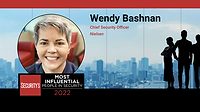Shannon Fariel-Mureithi, Director of Global Safety and Security at ChildFund International, has dedicated her entire life and career to humanitarianism and service.
While Fariel-Mureithi had a traditional path to security by way of her role as a law enforcement specialist in the United States Air Force, it was moving to Kenya to work for a non-governmental organization (NGO) in 2000 that solidified her trajectory and commitment to life-long service and security.
As part of her role at the NGO, Fariel-Mureithi shared her time between Kenya and Somalia. There, she saw firsthand the effects of inter-clan conflicts in Somalia, which left people within the communities with no choice but to flee and be displaced.
“When they did leave, husbands were killed, mothers and children ran, and families were separated. After becoming refugees, children would go years without education because they didn’t have teachers that could speak their language. It ripped my heart,” she says. “And I thought, why am I here? What am I doing here? And I really started questioning why I was doing what I was doing.”
Fariel-Mureithi turned her heartache into passion, making sense of how she could leverage her criminal justice and military background to help communities in war and conflict zones be safe.
This experience moved her in the direction of working in foreign policy, the security landscape and serving those that are underrepresented and vulnerable. “It’s all about people — the most vulnerable people. It’s not just about security structures or assessments. The important question is, ’Can we achieve our mission? And how can I help you achieve that mission?’” she says.
At the time, a roadblock to fulfilling her passion was the lack of security for NGOs. “Security for NGOs — particularly medium- and small-size — wasn’t seen as needed,” Fariel-Mureithi says.
But everything changed after the 9/11 terrorist attacks. NGOs became politicized and were seen as an entity of the government where they were hosted. “There were a lot of accusations that the aid workers were there to spy, and we just became more and more of a target,” Fariel-Mureithi recalls. “The need for duty of care and for health, safety and security in NGOs really started to be realized as a necessary business function a couple of years after 9/11.”
She returned to the United States and shared best practices with the NGO’s vice president that could help staff going into Somalia. The VP, well aware of her military background, asked Fariel-Mureithi to travel to other countries, provide risk assessments, and share courses of action to address safety concerns.
There, Fariel-Mureithi saw a unique need for her to use her passion to develop NGO security and go beyond and expand it to all NGOs — large, midsized or small. She’s carried that passion to every role she’s had since, and her tireless efforts for service have enabled business and people resiliency.
From conception to implementation, Fariel-Mureithi has built global security and crisis management programs within NGOs that have raised the bar and become the standard today. In 2014, after accepting a role At Food for the Hungry, an international humanitarian and development organization, Fariel-Mureithi served as the first Global Security Director and built the organization’s security and crisis management department.
It took several years, but Fariel-Mureithi was able to focus on security and obtain buy-in at Food for the Hungry, implementing security risk management, crisis management, international travel standards, duty of care, internal investigation processes and anti-terrorism risk management into programs where foreign-designated terrorist groups operate.
She also initiated enterprise risk management as a key business objective. “It’s a lot to say out loud,” she says, “but when I think about it, every one of those areas is huge in itself, and there was so much organizational collaboration. We attained the end results in 10 years, from having absolutely nothing to a functioning and developing security and crisis and risk management department.”
For Fariel-Mureithi, integrating security risk management and duty of care into established business functions ensures that security is a part of the business, not a separate function that could be overlooked. Through these efforts, Food for the Hungry was able to respond and assist thousands of refugees in Bangladesh, Rwanda and Uganda, as well as internally displaced people in South Sudan, the Democratic Republic of Congo, Kenya, Haiti and Indonesia.
At Food for the Hungry, Fariel-Mureithi co-chaired the prevention of Sexual Exploitation and Abuse Oversight Council (SEAOC) efforts to develop an internal investigation process for survivors of abuse. She led hundreds of critical incident management teams and has trained executives in crisis management response. Her efforts enabled humanitarian organizations to safely access and assist hard-to-reach communities affected by conflict, disasters and terrorism.
“Security exists to help programs achieve their objectives and to help emergency response during that critical stage when people really need that lifesaving support,” she says. “So it’s an honor and a privilege to be able to do that.”
In late 2021, Fariel-Mureithi took a position at ChildFund as Director of Global Safety and Security. The organization works to connect children living in poverty worldwide with the people, resources and institutions they need to grow up healthy, educated, skilled and safe. Delivered through 240 local and partner organizations, ChildFund programs address underlying conditions that keep children from achieving their potential.
At ChildFund, Fariel-Mureithi’s main focus is on developing an organizational security strategy and connecting it to an overarching risk management strategy. “Now, I’m able to position security to really influence the programs that help us achieve our organizational objectives and strengthen enterprise risk management,” she says.
Fariel-Mureithi has already set the building blocks of a security program, as well as accomplished a duty of care audit throughout the organization, so she can present the results to leadership to continue to build a security department. “Yes, it’s about building security. But, it’s more than that,” she explains. “It’s about connecting the head to the heart. Security has to make sense to all our employees who are not security experts, but who are absolutely critical to helping ChildFund meet the needs of our community.”
Given her passion for service within and outside the organization, Fariel-Mureithi has trained representatives from more than 100 organizations in security and crisis management to continue to evolve NGO security.
With other industry leaders, she developed the International NGO Safety and Security Association certification process centered around the Security Risk Management Competency Profile, which can help identify the necessary knowledge, skills, abilities and other characteristics for the job.
For those who desire to break into the NGO security space, Fariel-Mureithi mentors and coaches professionals on leadership, helping them look for internal and external opportunities to help them reach their development and career goals. She also encourages people and her teams to join security networking groups, just like she has throughout her professional career.
For more than 20 years, Fariel-Mureithi has been a part of the Overseas Security Advisory Council (OSAC) where she currently serves on the Executive Council as Council Advisory Subcommittee Chair, applying her insight and strong ties within international development and NGO domains to broader OSAC programming with a strong emphasis on diversity, equity and inclusion.
She also serves on the steering group for the Global Interagency Security Forum (GISF). “OSAC has been such a huge part of my life and part of my growth, just like GISF,” she says. “To give back to people and organizations is an honor and a privilege.”



